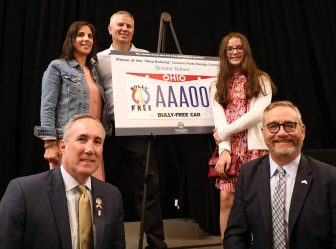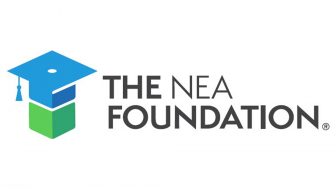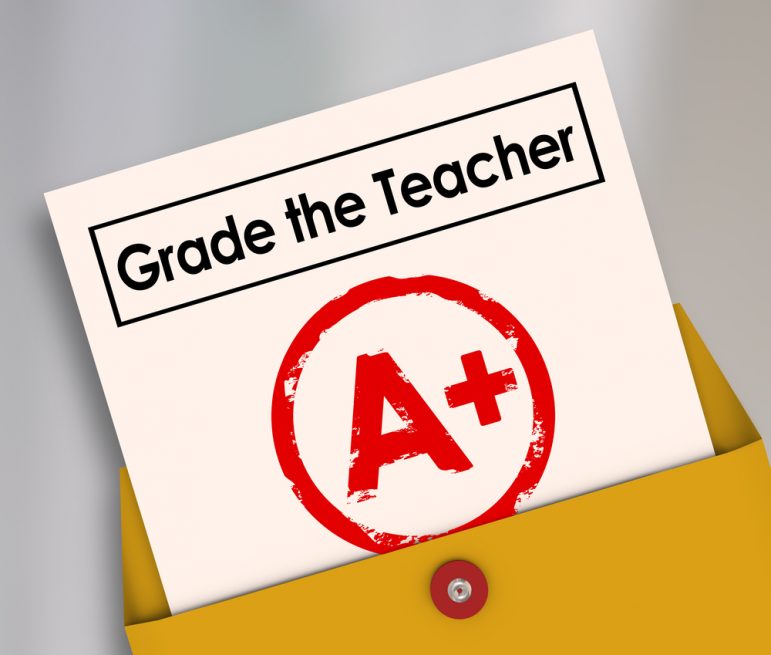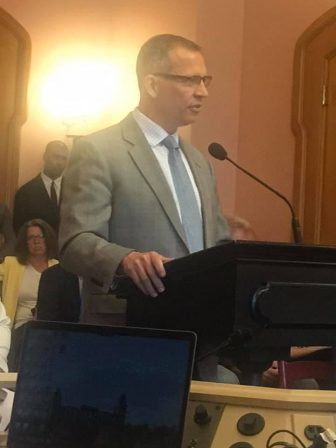Student Design Selected for ‘Stop Bullying’ License Plates

An 11 year-old Cleveland-area girl who has been dancing since she could walk, who plays catcher on her softball team and who just closed out the fifth grade with straight A’s is stepping into a statewide spotlight. But it’s thanks to another of her passions: art.
Ohio Attorney General Dave Yost and the Ohio Education Association announced June 18, 2019, that the design selected for a new “Stop Bullying” Ohio license plate is one created by Brooke Balser, a student at Independence Middle School in Independence.
“Bullies gain power when the people around them look the other way, stay silent or ignore the problem,” Yost said. “Each time we see Brooke’s colorful ‘Bully-Free Car’ design on an Ohio license plate, we’ll be reminded to treat others with respect and to stand up against bullying behaviors.”
Yost and the OEA announced a contest at the start of May to select the license plate design.
Ohio schoolchildren enrolled in kindergarten through fifth grade during the recently-concluded school year were invited to send in entries. In all, 171 entries were received.
An OEA committee judged the submissions on creativity, reflection of the “stop bullying” theme, and originality of design.
State Rep. Dave Greenspan (R-Westlake) was a primary sponsor of legislation introduced in 2018 to create the “Stop Bullying” plates. A measure implementing that idea became law in March 2019.
Contributions collected when vehicle owners order the plates will fund grants for nonprofit organizations, schools and school districts to provide bullying prevention training programs or similar educational opportunities.
Loveland E.A. Educator Selected as 2020 NEA Foundation Global Learning Fellow
Learning journey to prepare Loveland High School’s Abra Koch and students as global citizens

The NEA Foundation, a public charity founded by educators for educators, recently named Abra Koch, a Spanish educator at Loveland High School, in southwestern Ohio near Cincinnati, as a 2020 NEA Foundation Global Learning Fellow.
As a Fellow, Koch will spend a year in a peer learning network of 44 educators from across the country, building their comprehension of issues of global significance and ability to bring them into the classroom.
Over the course of a year, the NEA Foundation staff, partners, and program alumni will support the fellows as they immerse themselves in online coursework, webinars, and collegial study, including a two-day professional development workshop this fall and a nine day international field study next summer in Peru.
The 2020 fellows will use what they learn during the year to prepare their students for global citizenship.
 About the NEA Foundation
About the NEA Foundation
The NEA Foundation is a public charity founded by educators for educators to improve public education for all students.
Celebrating our 50th anniversary this year, the Foundation has served as a laboratory of learning, offering funding and other resources to public school educators, their schools, and districts to solve complex teaching and learning challenges. We elevate and share educator solutions to ensure greater reach and impact on student learning. We believe that when educators unleash their own power, ideas, and voices, communities, schools, and students all benefit.
Visit neafoundation.org for more information or on social media: @theNEAfoundation
![]()
 Oh Yes, We’re Social — Join the Conversation!
Oh Yes, We’re Social — Join the Conversation!
![]()
Dear So-called Average Teacher

By Julie Holderbaum, Minerva EA/OEA
Now that summer is here and you have time to breathe and reflect on the school year that just ended, maybe you’re feeling that your year was just, well, average.
If each year of your career is a song on an album, there are a number of reasons why this past school year isn’t going to make it to your greatest hits compilation.
Maybe you had a challenging schedule, a new prep or a new grade level. Perhaps you had a group of kids who didn’t work well together, or who were less academically capable than previous groups.
Maybe you had to learn how to work with a new colleague very closely, which even in the best of circumstances is a stressor. Maybe you lost your best teaching buddy to another school or district, the one whose room you could walk into, shut the door, and say, “You won’t believe the day I had” and vent your frustrations with no worry of judgement.
Maybe there was an administration change in your building that didn’t go smoothly.
Maybe your students confided in you more than usual and you know who has probation officers, pregnant girlfriends, and neglectful or abusive home situations. You know who is having sex and who is drinking on the weekends and who is bouncing from one friend’s couch to the next since there is nowhere else to live. Frankly, what you know about your kids’ personal lives is a heavy burden that weighs on you at school and does not dissipate just because you walk through your own front door at the end of the day. In fact, it gets heavier when you look around at your healthy family and your safe, comfortable home and your belongings that would be luxuries to so many of your students.
“Stress is stress and it doesn’t always stop and start as we move between home and school.”
Perhaps you had a particularly stressful personal year. You went through a breakup, or your child started driving or dating, or everything that could break in your house, broke. Maybe a loved one passed away unexpectedly, or maybe you watched someone you love die a slow death, and even though you had time to say goodbye, it still hurts deeply. Either way, grief can wash over you like a tidal wave, soaking every part of your life, even when you’re at school. Personal stress affects who we are in and out of the classroom, and professional stress impacts our personal lives as well. Stress is stress and it doesn’t always stop and start as we move between home and school.
 Maybe you feel like you didn’t do enough to support your profession this year.
Maybe you feel like you didn’t do enough to support your profession this year.
You didn’t rally at the statehouse, you didn’t email or call one single legislator, and you didn’t go to union meetings.
Social media alone bombards you with reasons to do all of those things, especially in Ohio, and it can be completely overwhelming to try to keep up with all the reasons we have to be activists, let alone make time to take action.
And then maybe you looked around and saw teachers who can do it all.
Nothing average about them, not this year or any year.
They advocate fiercely and ceaselessly for public education, create new ways to teach old material that inspires students and garners positive attention from administrators, and they balance work and school stress with aplomb. They have boundless energy, unlimited ideas for positively impacting kids and schools, and good days far more often than bad. They reap the rewards of their efforts with outstanding test scores and any number of teacher awards or honors. They are resilient and resourceful and recognized, and THEY ARE CHANGING THE WORLD while you are just trying to get through the day and the faculty meeting at the end of it.
Listen. Those teachers don’t exist. Some people fake it better than others, but we all have work stress that weighs on us, problems that can’t be solved with a new lesson plan. We all have personal lives that involve some broken hearts and broken appliances. We all recognize the value of the work of the OEA to help teachers advocate for our students and our working conditions, but we can’t be Norma Rae standing on a table holding high a sign that says UNION every day. After all, it’s hard to teach while holding a sign and standing on a table.
True, it’s important to strive toward professional success and to have compassion for our students, even if their stories weigh on us. It’s important to have rich personal lives, even if they are, at times, painful. It’s important to fight for public education, even though the battles can be exhausting.
But it’s equally important to recognize that no one can excel at every part of life for any extended period of time. For various reasons, we have years that are simply average, probably more often than not. You know why there are movies about Erin Gruwell (Freedom Writers) and LouAnne Johnson (Dangerous Minds). Because teachers like that, as wonderful as they are, are anomalies. Most of us never reach those heights and no one expects us to.
 Dave Stuart Jr., in his excellent book These Six Things, articulates this concept so well: “We are never finished becoming the teachers we hoped we’d be when we first set out.”[1]
Dave Stuart Jr., in his excellent book These Six Things, articulates this concept so well: “We are never finished becoming the teachers we hoped we’d be when we first set out.”[1]
The key is in the phrase “never finished”. Maybe you had an average year, for whatever reason. But think back to your first years of teaching. Are you better now than you were then? Most likely you are. There is no guarantee that we will one day be adorned with accolades and gold medals for teaching greatness. However, if we continue to strive to have a positive impact on the kids who walk into our classrooms every year, I think we are doing the job right.
We don’t always see, in immediate hindsight, the seeds that we have planted and the impact that we have had. During your “average” year, you may have unknowingly made one comment that turned around a student’s perspective on your subject area or even on his life.
I am admittedly biased, but I think a teacher who does an “average” job is still doing superhuman work that most people outside of education could not handle for a week, and even our average work can have a significant positive outcome on someone’s life.
When I became an educator, my high school government teacher told me that one of the blessings of teaching is that there are so many starts and stops. In no other profession are there so many built-in chances to begin again, whether it’s after a long weekend or at the dawn of a new school year.
So enjoy this momentary stop. Take a well-deserved rest. Appreciate the time to reset and rejuvenate. Reflect on the year that ended but look forward with hope to the year that is coming and the opportunity to continue working to be the teacher you set out to be when you first started. And then, in a few months, begin again.
[1] “These 6 Things – Dave Stuart Jr..” https://davestuartjr.com/these-6-things-how-to-focus-your-teaching-on-what-matters-most/. Accessed 13 Jun. 2019.
— Julie Holderbaum is an English Instructor and an Academic Challenge Advisor at Minerva High School, Minerva, Ohio.
STRS Board Adopts New Funding Policy Amendments
Changes made toward the goal of achieving full funding
 During its May 16, 2019, meeting at State Teachers Retirement System (STRS), its Board voted to adopt funding policy changes to outline objectives and the criteria for making changes to funding and benefits as well as when those changes should be considered by the Board.
During its May 16, 2019, meeting at State Teachers Retirement System (STRS), its Board voted to adopt funding policy changes to outline objectives and the criteria for making changes to funding and benefits as well as when those changes should be considered by the Board.
Additionally, at OEA’s urging, the Board adopted a change that at an 85% funding level or greater, the Board may consider changes in the plan that do not materially impair the fiscal integrity of the system.
OEA supports this change and supports restoration of COLA benefits as well as a reduction in employee contribution rates as financial conditions improve.
Click here to LEARN MORE or to download the June 2019 OEA Retirement Systems Update Memo.
![]()
Click here for more #OverTestedOH & #RedForEd Voices
June 2019 Ohio Schools Magazine
- COVER STORY: Award-winning students highlight what makes Ohio’s schools great in 21st Annual Create A Cover Contest p.15
- FEATURE: Springfield educators (Clark county) lead work to promote equity and social change p.11
- MAKING THE GRADE p.3
- 2019 Award Recipients
- Fiscal Fitness Awards
- OEA Educational Foundation’s Heartland Jamboree
Moved recently? Contact the OEA Member Hotline to update the address on file at 1-844-OEA-Info (1-844-632-4636) or email, membership@ohea.org. Representatives are available Monday-Friday, from 8:30 a.m. to 6 p.m. | OhioSchools — Past Issues

 Oh Yes, We’re Social — Join the Conversation!
Oh Yes, We’re Social — Join the Conversation!
OEA & WNCI 97.9FM Teacher Appreciation Party Highlights
Summer is here (almost). It is time to celebrate and thank the hard work teachers have put in all year!
Dave & Jimmy of WNCI 97.9FM‘s Morning Show, in collaboration with the Ohio Education Association hosted the annual Dave & Jimmy’s Teacher Appreciation Party, 7 p.m. Thursday, May 30th at Flannagan’s Dublin, 6835 Caine Rd, in Columbus.
Were you unable to make. Click the image above for video highlights of the evening.
#ThankATeacher
![]()
Click here for more #OverTestedOH & #RedForEd Voices and How to Make a Stand
Scott DiMauro: HB 239 — OEA Proponent Testimony

Tuesday, June 4, 2019
House Primary and Secondary Education Committee — Chair Blessing, Vice Chair Jones, Ranking Member Robinson and members of the Committee:
My name is Scott DiMauro. I am a high school social studies teacher from Worthington with 16 years of classroom experience, and I currently serve as Vice President of the Ohio Education Association (OEA).
On behalf of the 122,000 members of OEA, thank you for the opportunity to testify in support of House Bill 239, the Testing Reduction Act.
I would like to begin by thanking the joint sponsors, Representatives Gayle Manning and Erica Crawley, as well as the bi-partisan cosponsors of HB 239.
Over-testing is a real issue and it is keenly felt by Ohio’s parents, teachers and students. Students are experiencing testing anxiety and losing educational opportunities because of time spent on testing. I’m sure you’ve heard stories like these, and will no doubt hear more as you consider this bill.
Reducing testing is a worthy goal. To be clear, there will still be state-required and district-required testing if HB 239 is enacted. However, we are seeking greater balance which this bill helps to achieve. OEA enthusiastically supports the provisions of HB 239. I’ll review each of them briefly.
“Simply put, less time devoted to standardized testing means more time for teaching and learning in the classroom.”
Reducing State-Required Testing to Federal Minimums
 Federal law, the Every Student Succeeds Act (ESSA), requires a total of 17 tests for accountability purposes. These include annual testing in both English Language Arts (ELA) and Math in grades 3-8 as well as once in high school. Further, the law requires testing in science once in elementary school, middle school and high school.
Federal law, the Every Student Succeeds Act (ESSA), requires a total of 17 tests for accountability purposes. These include annual testing in both English Language Arts (ELA) and Math in grades 3-8 as well as once in high school. Further, the law requires testing in science once in elementary school, middle school and high school.
Ohio has 21 state-required achievement or end-of-course tests.
In grades 3-8 the state-required tests align with federal minimums. However, Ohio has a total of seven end-of-course exams in high school; exceeding the federal minimums by four tests. HB 239 would eliminate end-of-course exams in Geography, ELA I, American History and American Government.
Eliminating a state-required test on these subjects does not mean that they will not be taught.
Our state standards and courses that students need to take and pass in order to graduate remain unchanged. OEA does not believe that we need a state-required test for a subject to be important. In seeking to reduce testing, the most immediate step lawmakers can take is to reduce state-required testing to the 17 tests required under federal law.
Work Groups on District-Required Testing
The amount of testing that students endure is not limited to the state-required tests. Testing required by the school district also plays a major role. The bill requires each school district to form a work group to examine the amount of time students spend on district-required testing and make recommendations to the district board of education about how to reduce the testing load on students.
This work group would consist of parents, teachers and school administrators. In making their recommendations, the work group would consider: the time students spend on district-required testing, the district testing calendar, whether groups of students are tested at a greater rate than others, the purpose and use of tests and testing data, the financial cost to the district, and whether any tests are duplicative. The work group would also consider any previous testing audit or examination of testing that the district may have already performed.
“OEA believes there is great value in having this discussion at the district level.”
It can lead to recommendations that reduce testing time, save money and return instructional time to the classroom. It can also lead to a greater understanding among stakeholders as to the purpose and value of testing that is currently in place. OEA feels it is vitally important that teachers and parents are a central part of this conversation and strongly supports this provision of the bill.
Annual Board Resolution for Districts that Exceed Testing Caps
 Current law establishes a cap on testing time.
Current law establishes a cap on testing time.
Senate Bill 3, passed in the 131st General Assembly, states that school districts should ensure that no student is required to spend a cumulative amount of time in excess of 2% of the school year taking state-required or district-required assessments or 1% of the school year taking practice or diagnostic tests to prepare for testing. However, the local board of education may exceed those limits by passing a resolution after holding a public meeting.
At present it is unclear how many school boards have passed such a resolution. The Ohio Department of Education (ODE) does not track this information. Districts that are exceeding the testing caps may have passed a resolution as a one-time action or possibly not taken the action at all.
HB 239 would require an annual passage of such a resolution if the district is exceeding testing caps and would require the local school board to consider recommendations of the local work group consisting of parents, teachers and administrators. Such resolutions would be reported to the Department and ODE would issue an annual report on student testing time. This report will help to quantify how much time students are spending on testing and will help inform policymakers at the state and local level.
Voluntary Participation in the ACT/SAT

Current law prescribes that the ACT or SAT be administered to all 11th grade students each spring.
It is a great benefit to students that the state offers a paid administration of a college entrance exam.
However, if a student’s post-secondary plans do not include college (for instance a student enrolled in a career-technical program) then taking the ACT or SAT goes from a benefit to just another test they’re required to take.
HB 239 would require that the ACT/SAT is offered to 11th graders but that participation of students would be voluntary. OEA supports this change and believes that participation should be subject to a parental opt-out.
Closing Remarks
Chair Blessing, once again thank you for the opportunity to testify. There is a great deal of support and enthusiasm for reducing testing among OEA’s membership that is shared by students and parents around Ohio. OEA urges favorable consideration of HB 239.
I would be happy to answer questions at this time.
Current law prescribes that the ACT or SAT be administered to all 11th grade students each spring.
It is a great benefit to students that the state offers a paid administration of a college entrance exam.
However, if a student’s post-secondary plans do not include college (for instance a student enrolled in a career-technical program) then taking the ACT or SAT goes from a benefit to just another test they’re required to take.
HB 239 would require that the ACT/SAT is offered to 11th graders but that participation of students would be voluntary. OEA supports this change and believes that participation should be subject to a parental opt-out.
Closing Remarks
Chair Blessing, once again thank you for the opportunity to testify. There is a great deal of support and enthusiasm for reducing testing among OEA’s membership that is shared by students and parents around Ohio. OEA urges favorable consideration of HB 239.
I would be happy to answer questions at this time.
![]()
Additional Testimony Provided by the Following OEA Members
- Noel Blevins – Newark Teachers Association*
- Dan Heintz — Chardon Education Association
- Courtney Johnson — Columbus Education Association
- Kallee Bernish-Good — Student, Ft. Hayes Metropolitan High School, Columbus
- Colleen O’Connell — Reynoldsburg Education Association
- Rob Schofield — Avon Lake Education Association
- Erin Stevens — Pickerington Education Association*
- Gretchen Tash — Princeton Association of Classroom Educators
- Mandy Wagner — Canton Professional Educators’ Association
* Written Testimony Only
Daria’s Registration Page
Lorem ipsum dolor sit amet
Lorem ipsum dolor sit amet
Lorem ipsum dolor sit amet
Lorem ipsum dolor sit amet, inermis graecis sit no. Solet nominavi rationibus cu cum, cu sea semper option. Eam no animal mediocritatem, te duo clita nullam, eu libris necessitatibus his. Salutandi complectitur quo no, ea ullum dicant sapientem usu, id mea populo gloriatur sadipscing.
![]()
![]()


